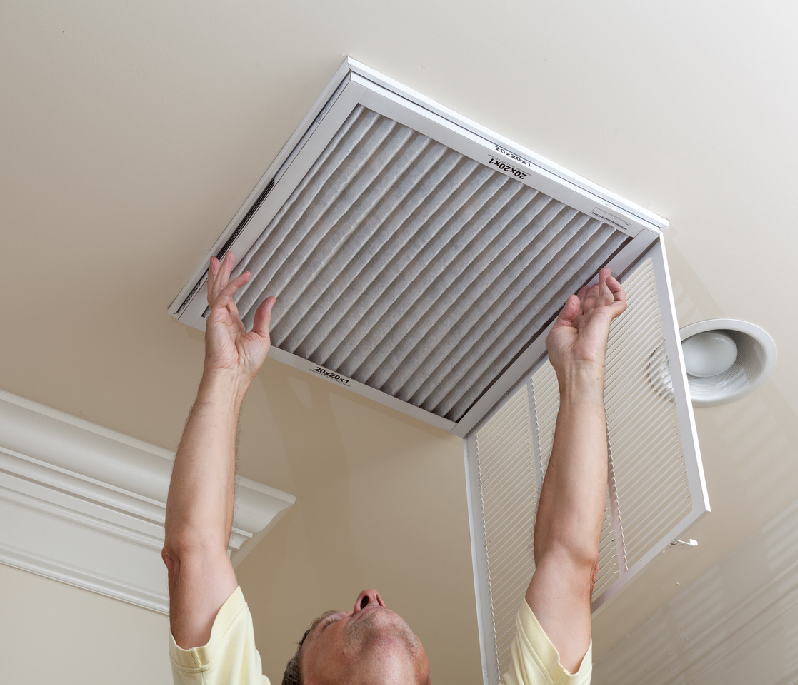Walton EMC shares 7 filter facts
that can lower your heating bills this winter
Regularly replacing the filter in your HVAC system is an inexpensive and easy way to lower your energy bill and keep your appliances working properly. Unfortunately, it's also a task we tend to forget about until a high electric bill arrives or (yikes!) a costly maintenance issue occurs.
The U.S. Department of Energy estimates that keeping your filter clean can reduce your energy consumption by 5-15%.
The U.S. Department of Energy estimates that keeping your filter clean can reduce your energy consumption by 5-15%. For the average Walton EMC homeowner, this can result in heating and cooling cost savings averaging $7-$20 every single month (based on 1,600 kilowatt-hours, the average Walton EMC residential customer-owner's monthly energy use).
Filter facts
Walton EMC’s Rigs Santos provides answers to some of the most common questions we get about filters for HVAC systems.
1. How often should I change my HVAC filter?
Typical recommendations range from every 30 days for cheaper fiberglass filters to as long as 6 months for higher-end pleated filters. A general rule of thumb for pleated air filters with a MERV rating of 8 (learn about MERV ratings in #6 below) or higher is to replace your filter every 90 days.
2. What are the true costs and savings associated with regular filter changes?
If you change your filters at least once every 3 months, or 4 times per year, your filter (rating MERV 8, 11 or 13) costs will average between per year, per filter needed for your house. If your average electric bill per month, you could save as much as monthly by changing your filter regularly (or, you are already saving that much if you change them regularly). Over three months, that’s
3. What are the consequences of not changing my filter regularly?
A system that has a dirty filter can suffer from pressure drop, which can lead to reduced airflow. This condition causes the system to work harder to keep a home warm or cool. This puts undue stress on the whole system, which can lead to equipment failure, resulting in repair or replacement.
4. Are there instances when I should be checking my filter more often?
You may need more frequent replacements if:
- You or someone in your household suffers from allergies or a respiratory condition.
- You have pets. Pet dander can become airborne and circulate through the home’s ventilation system just as typical household dust does. Also keep in mind that cats and dogs shed most when winter turns to spring and summer turns to fall, which are key times to replace your filter.
- You smoke indoors.
- You have a large family. More activity means more household dust, dirt and debris.
- You have a fireplace that you occasionally use.
- There is construction taking place around or near the home. Dust and debris from worksites can be sucked into the home’s ventilation system, which can tax your HVAC system.
- You live on a working farm. Dust and dirt that gets kicked up by outdoor work activity and/or large animals can be pulled into the home’s ventilation system.
5. How can I tell if my HVAC filter has trapped too much dirt and needs to be replaced?
Every few weeks, take out your filter and give it a look. If it has only a subtle layer of dirt under which the filter's material is still visible, it is in fine working order. However, if there's a coating of dirt so thick that you can’t see the filter’s surface, that's a sign it has been in your HVAC system far too long and is already compromising energy efficiency. Replace it, pronto!
6. What does the MERV rating I see on filter packages mean?
MERV is the abbreviation for Minimum Efficiency Reporting Value. A MERV rating tells you, on a scale of 1-16, how effectively your filter traps the small particles you don’t want circulating through your home. MERV 8, MERV 11 and MERV 13 are the most common filters for residential use. Anything below a MERV 6 is not recommended for home air systems because they are not highly efficient. However, filters with MERV ratings above 13 tend to restrict airflow and can damage some HVAC systems.
7. What’s the difference between MERV, MPR and FPR ratings that I sometimes see on packages?
The three rating systems were created by different organizations. MERV is the domestic and international industry standard rating system established by the American Society of Heating, Refrigerating, and Air Conditioning Engineers. As explained above, MERV rates a filter’s ability to capture and hold particles and pollutants.
MPR (Micro particle performance rating) is a rating system developed by 3M. It rates the manufacturer’s filters and their ability to capture airborne particles smaller than 1 micron.
FPR (filter performance rating) is the rating system used by Home Depot for brands sold through their stores. It uses a color code and number scale (4 to 10) that closely resembles the MERV rating.
